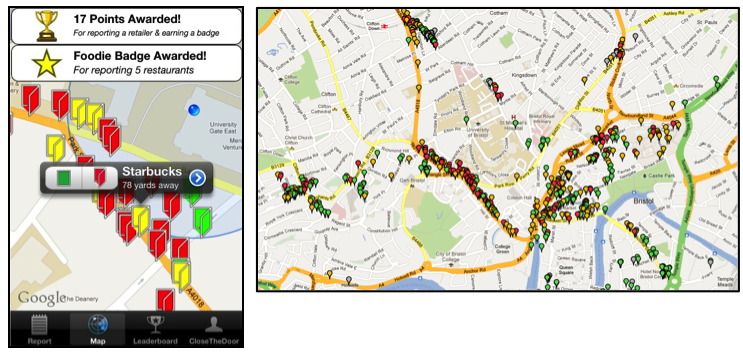 Community activist groups, including pro-environmental groups, are typically driven by a core group of highly motivated individuals. These people are often willing to dedicate a great deal of time and effort to help bring about desired change within their community. The Close the Door project considered how crowdsourcing can be used to supplement the activities of pro-environmental community activists, thus increasing the scalability of their campaigns.
Community activist groups, including pro-environmental groups, are typically driven by a core group of highly motivated individuals. These people are often willing to dedicate a great deal of time and effort to help bring about desired change within their community. The Close the Door project considered how crowdsourcing can be used to supplement the activities of pro-environmental community activists, thus increasing the scalability of their campaigns.
Publications:
Preist, C., Massung, E. & Coyle, D. (2014) Competing or Aiming to be Average? Normification as a means of engaging digital volunteers. ACM CSCW 2014, pp1222-1233 (pdf) (DOI link).
Massung, E., Coyle, D., Kater, C., Jay, M. & Preist, C. (2012) Using Crowdsourcing to Support Pro-Environmental Community Activism. ACM CHI 2013, pp371-380. Best Paper Honorable Mention. (pdf) (DOI link)
Summary:
On UK high streets it is common to see shop doors propped open to encourage potential customers to step over the threshold. However, during cold weather these open doors allow heat to escape. A detailed study of typical UK high street shops found that keeping doors closed can reduce emissions and energy from heating by 30-50%. In this project we worked with a community activist group, called ‘Close the Door’, that aims to achieve energy conservation by encouraging shop owners to keep their doors closed during cold weather. To succeed the group needs to actively maintain their database of shops and monitor the behaviour of shop owners on an ongoing basis. This is very time consuming.
We focused on mobile data collection applications and strategies that can be used to engage casual participants in pro-environmental data collection. The CHI paper reports on a study that used both quantitative and qualitative methods to investigate the impact of different motivational factors and strategies to engage casual participants. It provides empirical evidence for the effectiveness of two extrinsic motivation strategies, pointification – a subset of gamification – and financial incentives. Prior environmental interest is also assessed as an intrinsic motivation factor.
In the study each mobile app was used by 16 participants for two weeks. Results show that pointification increased performance, though not to a statistically significant level. However financial rewards led to significant increase in the amount of data collected. Surprisingly, interest in environmental issues and existing tendencies towards pro-environmental behaviour did not correlate with greater data collection. Qualitative data, collected through semi-structured interviews, allowed us to investigate such issues in greater details. For example we found that the factors that encourage people to initially take part in a community activism project can differ from those that maintain interest. Also, although motivational factors impact a person’s use of an app, motivation is complex and is only half the battle. Designers must also consider the enabling factors that influence casual volunteers’ use of crowdsourcing apps.
In contrast to previous HCI on pro-environmental technology, much of which has focused on individual behaviour change, this project offered new insights and recommendations on the design of systems that target groups and communities.
